Text
Dancing with the reversed King of Wands

It’s a truth universally acknowledged that if you’re a tarot girlie you must also pledge allegiance to some mythical or legendary creature - mermaids, unicorns, witches, faeries, angels, zombies, werewolves. As a vampire girlie I was excited to watch the latest adaptation of Anne Rice’s Interview With the Vampire, a series from AMC starring Jacob Anderson, Sam Reid, Bailey Bass and Eric Bogosian.
I’ll say from the outset, it feels like Anne was hardly cold in her grave (rest in peace) before this series was announced. I wonder if they would have been able to adapt the story as they did, had she still been alive; she always seemed to have a soft spot for Lestat, and AMC’s version of the character doesn’t shy away from portraying him as nasty and violent.

Sam Reid’s performance as Lestat is brilliant: at turns enthralling and repulsive, gentle and savage, he really brings out the brilliance and appallingly garden variety narcissism of Lestat’s character. He is a spider gently tugging Louis (and the audience) into his web with his complication and (pseudo?) vulnerability, before revealing his true self as he loses control of the narrative (and Louis, and us) to be no more and no less than an abuser.
If I had to ascribe him a court card, it would have to be the King of Wands reversed, perhaps supplemented by the Page of Cups reversed. Lestat has the charisma and compulsion of the King of Wands, but rather than use it for something good, it is all for himself, and to lure all to him. He strives to convince Louis and the audience that he has the innocence and neglect of the Page of Cups (standard practice, I think, for narcissists). Louis wastes a lot of time trying to coax that “side” of Lestat to the fore, wrongly believing this to be the true Lestat. The sad thing being that that “side”, insofar as it ever existed, is as lost to Lestat as his humanity.

Louis is in many ways Lestat’s complement - it’s what draws Lestat to him. For Louis, then, I’d give the King of Cups upright, and perhaps the Queen of Wands reversed as a secondary card. Far from a perfect man, he nonetheless has a good heart and a gentle spirit that, from an early age, has had to balance his dual natures: his public self and his private, queer self; his mixed cultural heritage; being mixed race but enjoying certain privileges because of wealth and so on. The moment that attracts Lestat initially is a moment Louis would prefer to forget, when he accosts his brother and threatens him with a knife. Lestat, from the getgo, has been interested in nothing but Louis’ destruction.
As for the reversed Queen of Wands: Louis is more likely to be roused to act on behalf of others than for himself, and the times he does act on his own behalf end up costing him dearly (his “club” and eventually Lestat and Claudia both). There’s also no small amount of pride there. In his conversation with Daniel Malloy, Louis denies Malloy’s insistence that he, Louis, has been a victim of domestic violence. “Are we the sum of our worst moments?” he asks Malloy. So we see the Queen of Wands reversed, thwarted by Lestat’s monstrosity, but too much in denial to admit it.
Jacob Anderson is a good contrast to Reid’s Lestat; more malleable, at turns strong and fragile. One wonders what lurks beneath the “present day” Louis and his seeming implacability.

We can’t talk about Lestat and Louis without also talking about Claudia. She is, somehow, the most inhumane and human of the trio. They had a really good actress in Bailey Bass, who gives Claudia a child-like charm which is at different times horrifying and heart-wrenching. Claudia is a mix of the Knights of Cups and Swords for me; chameleon-like, compulsive, clever, manipulative, with a strong sense of her own rightness and even honour, especially when opposed to Lestat. Had she been allowed to age/grow, the Queen of Swords might have been her destiny. The bitterest irony? That the event Claudia so carefully orchestrates to emancipate her and Louis from Lestat’s control (his death) directly leads to her death*, and that the very person she did it for couldn’t even find it in himself to really let Lestat die. Claudia does find her freedom in death; but present day Louis is very much still shackled by his past.
For all that it is a fantasy series, Reid’s portrayal of Lestat is one of the most realistic I’ve seen of narcissism. The love bombing, the triangulation, the manipulation, the lying and breadcrumbing, the gaslighting… Chef’s kiss.
What will the second season bring? Unfortunately, Bass isn’t returning as Claudia, which I think will make the character’s death less impactful (regardless of the ability of the actress who replaces her). I wonder if they’re going the route of not showing the death at all, or their time in Europe?** I really hope they don’t do a disservice to Reid’s Lestat by trying to give him a redemption arc. Louis would probably insist otherwise, but there’s no redemption for some things, not even when you really want there to be.
*If they follow the events of the book. **Since writing this, photos have been released from the second season showing the European timeline.
1 note
·
View note
Text
Deceived in a different direction – thoughts on Doreen Virtue’s Deceived No More and the search for answers
“He pulled a Doreen Virtue,” someone wrote in the comment section of a tarot reader who posted a Reel about their conversion back to Catholicism, which also served to denounce their former practices as dangerous and sinful.
I’m sure Doreen Virtue is thrilled that she’s become the lingua franca for (relatively) prominent woo people who convert to Christianity and condemn their previous path as demonic/evil/misguided in the process. Doreen Virtue – riding on the success of Sophy Burnham’s A Book of Angels, published in 1990 – was Hay House’s darling during the late 90s up to the late 00s. Then, in 2018, she announced that all that was dangerous and demonic and that she’s found the real deal in evangelical Jesus.
This is not an uncommon trend, and in trying to understand it – and seeing how many parallels there are to my own ‘Doreen Virtuing’ back in 2010 – I thought I’d take a closer look at Virtue’s Christian memoir, Deceived No More, published in 2020.
Why Virtue’s book?
There are two reasons I’m using Virtue’s book.
First, her about-turn is relatively recent, and in my opinion, there is a potentially interesting connection between her conversion and the run-up to the Trumpian era of politics. This might illustrate the growing ‘new age to alt right pipeline’ we’re seeing.
Second, Virtue was big in the new age scene and released dozens of spiritual books and card decks. She also toured the world giving workshops and presentations. Why would she abandon two decades of work? Or, as we’ll see, might this influence (and its waning) factor into her conversion more than she’s admitting?
Let’s get into the book.
Virtue’s main argument against the New Age: ‘Because the Bible says so’
If you were hoping that Deceived No More would blow you out of the water with its astute exegesis, keep dreaming. Throughout this repetitive book, Virtue’s main argument is that the Bible says so. She offers no explanation and leaves no room for any alternate view of the Bible. In chapter 6 she calls it “God-breathed and internally consistent”; in chapter 11, she advises her audience to ask whether spiritual directors or life coaches believe the Bible is God’s inerrant word. In chapter 9, she writes that one of her four revelations upon converting were that “the Bible is inerrant and trustworthy”. “I didn’t need to consult with apologists (people who defend the Christian faith and inerrancy of the Bible), as I knew for certain that the Bible is God’s Word.” How does she back this belief? By saying (later in the eleventh chapter) that the only way to understand the Bible is through the Holy Spirit, and you don’t get that until you are saved.
As for her hermeneutic approach, she – like many biblical ‘literalists’ – don’t believe they have one. They take the ‘God wrote it, I believe it!’ stance. But no one approaches anything without bias or preconceived ideas – not the original authors/scribes of the texts that would eventually be collated into the Bible, and certainly not the scholars who translate these texts into modern languages. We all have lenses through which we view and interact with the world. It is by understanding these lenses and how they influence us that we arrive at greater self-understanding and compassion towards ourselves and others. Pretending that these lenses don’t exist – or being confident that your view is the only view, because the text you’re interacting with appears to tell you so – is a logical fallacy and a spiritual dead-end.
I was surprised to see just how far right Virtue has swung. Her reading of the Bible is extremely legalistic. In chapter 2 she writes, “God can’t overlook our years of using His name is vain, practicing idolatry, slandering our neighbor, having lustful thoughts, dishonouring our parents, and so forth. Sinful behaviour always has consequences. This isn’t an appeal to legalism, however,” she concludes, but then also says: “Instead of hearing the gospel, mockers need to hear the Law” (chapter 6).
Not all biblical literalists are conservative, but most ‘inerrant’ churches lean conservative. So if we were in any doubt about what exactly Virtue converted to (namely evangelical Christianity)…
“He [the devil] tells you that you’re ‘woke’ if you realise ‘the truth’ that God is simply the ‘universe’” (chapter 6)
“New Agers blame politicians and conservatives for the problems in the world, instead of blaming Satan” (chapter 6)
Which brings me to Virtue’s conversion timeline.
2015: On January 14th she listens to Alistair Begg’s sermon, “Itching Ears”. Begg is a Scottish minister pastoring in Cleveland, and Virtue would go on to adopt many of the same doctrinal stances that his Parkside Church espouses. She credits this sermon as the start of her conversion.
2016: She and her husband Michael attend a Pentecostal church and church shop, including a stint in an Episcopal church. She takes pains to emphasise that Michael wasn’t forcing her away from the new age, but that they left it together.
2017: On January 7th, she has a vision* of Jesus; she is baptised in an unnamed protestant church on the 25th of February (probably the Episcopal one); she and her family move to Seattle on November 17th.
2018: Hosts “The One Year Bible” Instagram live Bible study daily. She posts Deuteronomy 18:10-11 on Instagram on October 6th; is “fired” from Hay House “a few weeks” before Christmas; joins a Baptist church sometime during this year or at the end of previous one.
2019: Would this be when she starts her MA at Western Seminary?
2021: Graduates Western Seminary with an MA in Biblical and Theological Studies.
Sometime before their move to Seattle, Virtue gets “sucked into the world of conspiracy theories”. “I became obsessed with ‘the new world order’, ‘chemtrails’, and the Illuminati. I was constantly upset about genetically modified foods and politicians who didn’t vote as I thought they should,” she writes in chapter 7. My theory – and it is just a theory – is that Virtue’s conversion was influenced by booming Q-Anon rhetoric and the political climate leading up to Trump’s election in 2016.
This wouldn’t be surprising; in fact, it’s got its own term: the new age to alt right pipeline. In a Maintenance Phase podcast on the topic, for instance, they talk about how new age adherents can be especially vulnerable to alt right beliefs and talking points. They specifically reference how a distrust of authority coupled with a niche belief that appeals to particular people – new agers may be especially vulnerable to antivaxxer rhetoric, for instance – then segues into right-adjacent conspiracies which segues into the right itself.
Something the podcast doesn’t mention but that I think also applies, especially in Virtue’s case, is the intersection of white supremacy and white privilege in pushing new agers into alt right territory. The new age tends to be very white, very American, very aspirational middle class. Privilege experiences change, diversity and inclusiveness as threatening. In times of change, then, it’s not uncommon for those with certain privilege to revert to conservatism. In the next section we’ll look at how this may have contributed to Virtue’s about-turn.
Little Miss Popular
In chapter 8 of Deceived No More, Virtue writes, “Right before my salvation, I was at the pinnacle of my New Age career.” It’s true that she published with Hay House consistently – sometimes yearly - since the early 00s, but that had slowed down by the early 2010s. Her last book with Hay House, Sweet Dreams Scripture: Bible Verses and Prayers to Calm and Soothe You, was published in 2017.
But were angels, Virtue’s primary selling point, still popular?
According to Google Trends, global interest in angels peaked in 2009, with a steady overall decline up to the present. The search term “Doreen Virtue” peaked in 2016, presumably around the time she became more vocal about her changing beliefs. The drop-off in searches for her (search terms and topics) between August and November of 2017 was steep.
My speculation is that Virtue’s popularity was already tapering off as Hay House expanded into tarot and other aspects of woo. I like angels as much as the next person, but Virtue’s angelology is particularly saccharine, which, as the world spun from the blow landed by Trump’s election, just wasn’t cutting it. Hay House have also been trying to diversify their demographics. I wouldn’t be surprised if Virtue was simply aging out of popular appeal.
Virtue, though, attributes her sales slump wholly to her conversion (and she may very well be telling the truth; I don’t know). In chapter 13 she notes, “[M]y former publisher reported that my conversion was dramatically affecting my book sales… My former publisher’s accountant estimated that my earnings would drop by 70 percent that year.” This is ultimately what prompts them to move to Seattle.
In the book she attributes this move, depression and unhappiness on social media (she calls it spiritual warfare) to her finally breaking completely with her former path. “Soon after we moved [almost a year later, actually], I made a social media post with the verses from Deuteronomy 18:10-12. In the comment of the post, I said that this was the Bible passage that led me to quit the New Age practices. About an hour later, I received an email from the president of my publishing house informing me that I’d crossed the line with this post. He was concerned that I’d offend witches with these Bible verses that condemned divination, fortune-telling, omen interpretation, mediumship, and witchcraft. Since the publisher had newly begun printing witchcraft books, they didn’t want to upset their customers. He told me I was fired” (chapter 14).
She goes on to lament the direction that Hay House was moving in: “I’d been working with that publisher for twenty-five years and was their top-selling author. We’d travelled around the world together, and here I was getting fired by email three weeks before Christmas. I was losing my radio show, my website, and my publishing contracts. When I’d first started with the publisher, they only printed books about health, inspiration, and positive affirmations. They wouldn’t even use the word psychic or other New Age terms in their books. Here they were, twenty-five years later, printing witchcraft books! This showed me the progressive nature of deception.”
This kind of resentment is one of the constants of the book, along with reminiscences about how popular she used to be, and her endless defence of herself for not knowing better at the time. In chapter 14 she writes about how her New Age friends – “many of whom I helped get publishing contracts” – stopped contacting her. Is it any surprise, though? According to those verses in Deuteronomy, the verses that ultimately converted Virtue, God abhors people in the new age.
In chapter 6, Virtue quotes New Zealand-born evangelist Ray Comfort, “The gospel is inherently offensive to most people.” “Don’t be surprised or take it personally if your loved ones become offended by your evangelising.” Later in chapter 8 she adds, “It’s so ironic that before I was saved, I used to judge Christians as being judgmental. The irony was lost on me until the first time I was called a judgmental Christian when I was only trying to help someone.” Yes, the irony does seem to be totally lost on her.
“My old friends, and some New Age family members, saw my evangelizing work as being ‘unloving’. One family member informed me that Jesus would never talk this way. My relative gave me an ultimatum: either I stop evangelizing against the New Age or I wouldn’t hear from him again.” I’m pretty sure this relative is one of her sons, Charles.
It seems that Virtue’s conversion was shrouded in and accompanied by a lot of anger and lingering resentment, but is it possible that anger/resentment precipitated it? Resentment at a changing market, resentment at a changing publisher, resentment for no longer receiving the “rockstar treatment” she spends so much of Deceived No More talking about? Resentment, even, at a changing world?
Dowdy dressing for Jesus
One of the more bizarre aspects of the book (and there’s plenty; the line “The enemy is a sugar daddy who’ll give you the high life” comes to mind) is Virtue’s attachment to fine clothing and how she thinks Christians are dowdy dressers. In chapter 3 she writes, “I judged them [Christians] as ‘fear-based’, which is a New Age term for someone who operates out of fear, guilt, and negativity. I also thought their manner of dress was boringly conservative.” Oh, you think she mentions it just once?
“Five minutes into the start of each workshop, I’d invariably see two or more conservatively dressed women get up and leave. Looking back, they were probably Christians” (chapter 5).
“[I] donated and sold most of those clothes [the designer dresses] and learned how to wear modest and inexpensive clothing with grace” (chapter 1).
She references her previous lifestyle numerous times, with varying degrees of regret:
“I was seduced by the first-class lifestyle from my New Age teachings… We [her and her husband, Michael] were treated like rock stars on the New Age tours.”
“It all seemed so exotic and exciting!”
“I didn’t realize that I was spending money faster than I was earning it, and after taxes I rarely had much money left over. That kept me in a cycle of continually giving workshops so that I’d have enough money to pay my bills. The devil is an evil genius, y’all. I grieve now thinking of how I could’ve helped impoverished families with that money!” (all from chapter 4)
What I’m driving at is this attitude of Virtue’s that, without using quite as many words, signals she’s a martyr for Christ. She calls it sanctification – chapter 11 is titled “sanctification in the public eye” – but I wonder if there’s an early draft where she used the “m” word. She talks about how she “felt altruistic, like a martyr, denying myself pleasure in order to bring the latest messages to people in my books, audios, videos, seminars, and cards” in the fourth chapter, referring to her new age work. That same attitude persists into her conversion. Her readers are to understand exactly how much she sacrificed to be ‘right’, and she takes much more pain to explain what she’s lost than she does to explain what she’s supposedly found. Which brings me to my next point: what is the goal of this book? Who is it for?
Who is this book for?
The thing that puzzled me most about this book is exactly who its intended audience is supposed to be. You’d expect it to be geared towards new agers, since Virtue apparently regrets her previous teachings so much, but listen to what she has to say about unbelievers:
“Spiritual blindness is a real and pervasive condition. The Bible says that Satan has blinded the minds of those who don’t believe in Jesus, so they’re unable to see the glorious light of the gospel. The devil puts a veil up so that the gospel is hidden and the Bible isn’t understandable to unbelievers… As author Justin Peters recently told me, ‘False teachers are part of God’s judgment upon unbelievers.’ As difficult as it is to fathom, God used my false teachings in His wrath against me and unbelievers” (chapter 6).
For all that Virtue is so regretful about her old teachings and beliefs, she seems curiously uninterested in reaching her old fan base and more interested in defending herself against them and Christians sceptical of her conversion. What she writes in chapter 6, quoted above, reads like a pre-emptive defence for Deceived No More’s inevitable failure to sway her previous audience. As for the sceptical Christians, her primary defence there is ignorance:
“[I] wasn’t a rebellious Christian but a biblically ignorant and foolish unsaved person who didn’t know the true gospel” (introduction)
“[I] was just ignorant of true theology” (chapter 8)
“All those years, I didn’t know I was following a false Christ” (introduction)
Virtue also takes aim at doctrine and teachers she doesn’t approve of, which strikes me as arrogant for someone who at the time of writing the book had only been a Christian Christian for two years (by her own estimation). Joyce Meyers (who I don’t like, either, by the by) is dismissed as a false teacher, and Virtue has a little hitlist of doctrines she considers unbiblical and warns people about. I’ll talk more about this in the next section.
The only time this book stirred any emotion in me is in chapter 11 when Virtue is talking about the Episcopal spiritual director she saw for a short time. “She reassured me that I didn’t need to change anything in terms of deleting cards or crystals from my lifestyle. I simply needed to add Jesus and the Bible, and she said that I should embrace my gifts from God… Now I realize the Holy Spirit was convicting me against following her counsel. The upset I felt was conviction [emphasis hers] from the Holy Spirit, who steers saved people away from sin and back to God’s will. I almost fell for her advice since she seemed wiser and more biblically educated than I was. Ultimately though, it was the author of the Bible—the Holy Spirit—who taught me what was right.”
This was probably the last genuinely kind advice Virtue got before she phased completely into conservative evangelicalism, and she was too defensive, angry, insecure and arrogant to realise that the spiritual director could see which direction she was heading in and trying to help her.
The New Adventures of Old Doreen
I believe that Doreen Virtue believes she’s changed, but I see little evidence of that in Deceived No More. Mostly I see someone trying to reestablish herself in the publishing world – the Christian one, this time – and having to convince people that she’s no longer who she used to be to do so.
In the previous section I mentioned how Virtue has a hit list of what she considers heresy. I’m less interested in her theology and more interested in how unable she is to resist setting herself up as a spiritual authority even if, by her own admission, she doesn’t believe women should teach or preach (she coyly references 1 Timothy 2:12 in chapter 14).
One of her first projects after coming out of her Christian closet was to start a Bible study/group reading through The One Year Bible. “I wasn’t qualified to teach the Bible then [emphasis mine], but I could share commentaries of each day’s Bible reading…” she writes in chapter 14. “The group was free of charge without any financial compensation, so I was really leaning on God, knowing that I’d be involved in researching and teaching [emphasis mine] daily without pay for the whole year.”
This contradicts what she has to say about herself in chapter 6: “The public outpouring of anger against my conversion was humbling, and I saw that popularity is fickle and conditional. I am also humbled by going to seminary classes, where I’m the oldest person in classrooms filled with twenty-five-year-old future pastors. I’m an invisible person in these classes, which has been humbling in a healthy and necessary way.” Virtue was and still is pursuing spiritual authority; it’s just a different stage and a different audience. This doesn’t really gel with her narrative of being a repentant and humbled sinner, does it? (Also, as far as I can tell, the One Year Bible group predates her enrolling in seminary.)
While Virtue repeatedly professes regret for her previous lifestyle, she seems genuinely confused that her actions hurt people. “[P]eople seemed to interpret my denouncing [the new age] as being ‘hate speech’, when my entire motivation was love. I cared enough to warn people about the New Age leading to hell, and I risked losing everything and everyone to sound this warning,” she writes in her introduction. In chapter 14, she says, “The more I spoke openly about changes that stemmed from my conversion to Christianity, the more confused and upset people who followed my work seemed to become.” For someone who has a MA in counselling psychology and who resisted attempts at being evangelised herself for decades, Virtue has little empathy for her previous audience and seems to resent that her good intentions don’t cover her officiousness.
Leaving the new age
So what did Virtue find in Christianity that she couldn’t find in the new age? As far as I can tell (and as much as she’ll admit to), she felt spiritually unfulfilled. In the first chapter of Deceived No More, Virtue writes: “I was unknowingly hungry for the love that only God can give. I’d followed all the New Age prescriptions for healthy, happy living… The New Age, for all its promises, could not save me. Only Jesus could.”
This sentiment is familiar to me because in 2010, I converted to Christianity after several years as a Pagan. There’s a lot of overlap between modern Paganism and new age practices, (which neither group enjoys admitting). Both are groups that follow a spacious set of doctrines or beliefs, a kind of hodgepodge of different practices under wide, inclusive umbrellas.
I recognise the spiritual hunger Virtue references, but I also recognise – which I’m not sure she does, yet – that that hunger doesn’t occur in a vacuum. In hindsight, for me it was a product of PTSD from cancer treatment and abusive relationships, and as yet unrecognised/misunderstood autism, ADHD, and queerness. I’ve thought a lot about my conversion in the years since I’ve left the church and ministry. Virtue doesn’t doubt the validity or meaningfulness of her conversion experience, nor do I mine. But I understand now that it wasn’t so much Jesus, or just Jesus, that pulled me in: I was, I believed at the time, also converting to acceptance: as a Christian, surely I would never feel like an outsider again.
Was it the same for Virtue? I do wonder if my speculations about political rifts, resentment at power shifts at her previous publisher and in society in general, and general financial stress contributed to an environment in which she, too, was yearning for acceptance – or, at the very least, no further loss of privilege. And if she could no longer find that in the new age…
Deceived in a different direction?
One of the worst things I experienced in my time in church and ministry is that some people genuinely enjoy the thought that God loves them and not whatever ‘other’ they most distrust, resent, envy, or hate. I’ve known Christians who seem especially to resent grace: if they work so hard to prove their faith – put in so much time in Bible study, prayer, church attendance and volunteering – and are ‘sinless’, or at least less sinful that someone else – why should others get a free pass to God?
Unfortunately, as we’ve seen in Deceived No More, it appears that Virtue is now one of those Christians. In the first chapter of the book, Virtue writes: “[There] were two desires that drove me toward the New Age. The first was a desire to help people, and the second was a desire for secret wisdom.” It’s hard not to see Virtue’s conversion as a continuation of her previous thinking. As a new age author, speaker, and teacher, she could sell access to her ‘secret knowledge’ – helpfully presenting herself as its arbiter – in book, radio and workshop format. As an evangelical Christian, she does the same thing…via exclusionary doctrine. The only difference, as far as I can tell, is that she’s swapped the carrot for the stick: she’s now found the secret knowledge, and if her search is over, then everyone else’s should be, too.
Some concluding thoughts
The converting tarot reader that inspired this reflection recently changed their Instagram handle to something more appropriately Christian. They appear to be setting themselves up to teach their 30k followers “real Catholicism”. Virtue’s social media presence is focused on educating people about the dangers of the new age – especially her YouTube presence – while espousing her ‘biblically inerrant’ Evangelicalism. And of course, both of them believe their brand of Christianity is the correct one. Both of them believe that their faith system has the answer.
I find it so ironic that the reason we generally first turn to religion and the primary thing that drives a wedge into our maturing faith system is ultimately the same thing, namely: expecting answers.
We commit to religion to find answers to life’s questions and reasons for life’s difficulties. It provides us comfort, community, structure: rules to live and die by, context to make sense of ourselves, a place to belong to something greater than ourselves.
But as our faith journey continues – and I do believe this is a universal experience – as we butt up against the limits of religion-as-answers, we enter new territory: religion-as-experience, religion-as-questioning, even religion-as-doubt.
In the tarot we see this transition happening as The Fool navigates three cycles of seven cards in the Major Arcana in a process of self-individuation. In 78 Degrees of Wisdom, Rachel Pollack writes:
The division into three allows us to see the Major Arcana as dealing with three distinct areas of experience. Briefly, we can call these: consciousness, the outer concerns of life in society; subconscious, or the search inward to find out who we really are; and superconscious, the development of a spiritual awareness and a release of archetypal energy.
To move away from religion-as-answers is risky business, though. It’s uncomfortable and it frequently brings us not just to the limits of our religious understanding, but also to the limits of our ego and induces us to face our innermost selves. If we can’t stand the tension, if we can’t find a way to cope with dissonance, if we find ourselves faltering when faith is a question mark rather than a full stop, we regress.
While I don’t think we’re judged for this, I do think we miss out on something and we’re poorer for that loss, as are our communities.
Any religion or spiritual persuasion – including the new age, including evangelical and Catholic Christianity – that isn’t elastic enough to hold difficult things in tension and through that tension, birth something new – is brittle enough that it will snap if there’s too much pressure. I think the same is true of its adherents.
If we can’t collectively, regardless of our religion, be elastic enough to hold difficult things in tension and through that tension, birth something new – we will snap if there’s too much pressure.
When someone does a Virtue, rather than seeing it as a challenge to legitimacy of whatever path they were on, I think we’re better served seeing it as an opportunity to hold space for the human condition, in others and in ourselves.
We move through The World as The Fool, happy for every opportunity to step off the cliff from what we were once so certain we knew.
*She has a Jesus vision but goes on to denounce this as demonic, too.
0 notes
Text
Strength
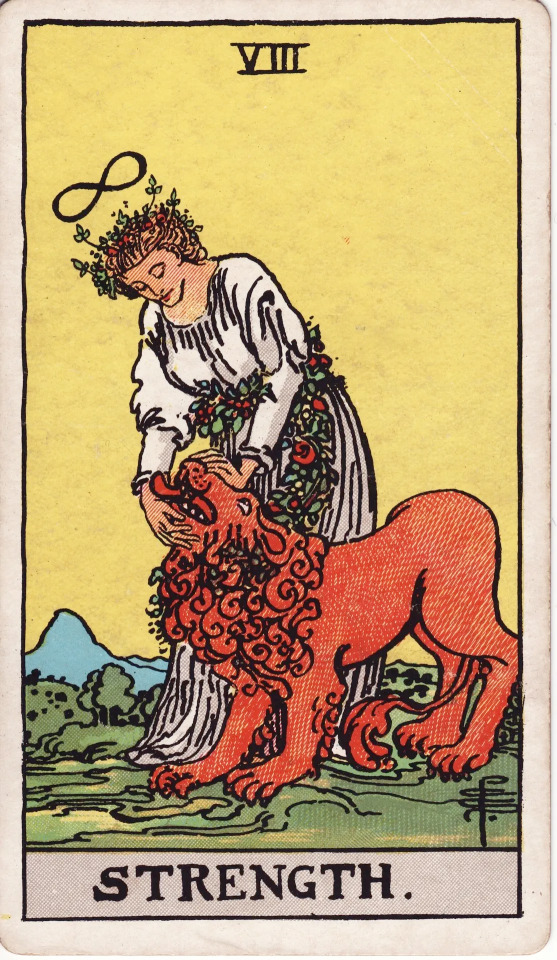
2024’s tarot card is Strength. (2+0+2+4 = 8). The card image shows a serene woman, clad in white, adorned with garlands and crowned with an infinity symbol, gently closing the snout of a roaring red lion.
The title of the card says what it means. Strength signifies strength and courage in all its forms. This strength – whether it’s getting out of bed in the morning when you’re going through a tough time, biting back an unkind word, or winning a sporting event – comes from the kind of inner reserves of calm of people who have “tamed” their lion, like the woman in the card.
What is the lion? Different people from different eras have had different interpretations. Some see it as the shadow self; others the unconscious; others the ego. I tend to think of it as the conditioned self, the reactive self. But I do like the interpretation offered in Tarot Deciphered* and 78 Degrees of Wisdom**: that the red lion symbolises the alchemical transformation of sulphur into gold, in other words, a base element into something precious. I’d amend this by saying that this is a process of rediscovery for, from a spiritual perspective, we are all “gold” (whole) and the spiritual life is the journey of throwing off the amnesia that prevents us from knowing ourselves and our Creator.
I recently saw a video talking about how humanity tends to repeat cycles of 80 years, something I’m sure astrologers have an opinion on. We see this repetition – evolution? – in the infinity sign above the woman’s head in the Strength card. Tarot Deciphered notes that in addition to alchemy, this symbol represents the solar analemma, the path the sun takes through the skies from the perspective of the earth.
Everything loops back around on itself: our lives, our psychology, our planets, our understanding. Gen Z is rediscovering 00s fashion (to the horror of fellow 00s teens like myself), which itself was a riff on the 70s and 80s. We turn to old Roman philosophers to explain our complicated modern lives, to hundred-plus year old cards to make sense of our lover’s indolence in replying to our texts. We turn to the stars, to each other, to the popular hit TV series Friends, as per Leave the World Behind. Each layer of our lives builds on the strata of days lived, loves won and lost, deeds accomplished or abandoned – an archaeological excavation of our souls.
Approached in another way: we cannot truly fail. Or at least, our understanding of failure is itself a failure of imagination. We’ll loop back to what we’ve bungled up, missed out on or misunderstood again at some time, and then we will either be strong enough to seize it, or strong enough to finally let it go.
If we therefore conceive of our lives as a lemniscate rather than as a straight line, what guidance does that offer us for 2024?
*Tarot Deciphered, authored by T. Susan Chang and M. M. Meleen.
**78 Degrees of Wisdom by Rachel Pollack.
0 notes
Text
Pricey truth

I was so happy to see that Good Omens has been renewed for a third (and final) season. I’d prefer three good seasons to four seasons where you wish the last two hadn’t happened (cough Sherlock cough), and I’m curious to see how dear Crowley and Aziraphale end up.
How I envy the young, who get to see their version of SuperWhoLock actually get some action, whereas all the actual SuperWhoLocks got was a lot of flack for daring to interpret obviously queer storylines as queer. After all these years (it was the tenth anniversary of some Sherlock season recently), I still hold a special little grudge that we had to settle for subtext. But, with difficulty, I digress!
I have such a soft spot for Aziraphale, because 1) Michael Sheen is adorable and 2) Aziraphale reminds me of myself. His decision at the end of the second season? I understood it perfectly. Like him, I tried (and failed) to change the system (institutional religion) from within. For my trouble I received a prodigious amount of trauma. I haven’t been able to set foot in a church in years, and Lord if I didn’t try to love the institution as best I could.
In retrospect, I wasn’t just trying to change the institution from the inside - wasn’t just trying to take the love of God and remove the ts and cs happily slapped on by the church for, I fear, the most banal reasons - money and power. I was also trying to change myself. My queer, neurodivergent self. I feel so silly now for having as much faith as I had that the organisation built on the premise of loving people and loving God would also love and accept myself and others like myself. So I see in Aziraphale’s decision my own, taken many years ago: that I would make it work; that surely the grace of God would carry me through.
Reader, it did not. At least, not in the way I was hoping it would.
How I wish I’d had a Crowley to try to dissuade me. Now I am the Crowley, my own inability to enter a church (the building or the concept) so similar to his actual aversion to holy ground (remember those little jumping steps he did when he went to save Azi in the church?) Asking a few questions - questioning things in general - having an opinion that someone higher up than you doesn’t like? Anathema to the institutional church.
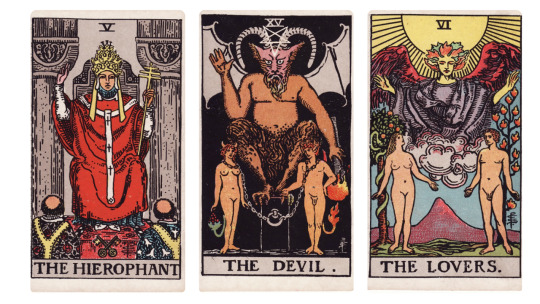
These two remind me so much of The Hierophant and The Devil cards. Aziraphale embodies the faith and tradition (and faith in tradition) that is The Hierophant. There is a way to do things and there must be a good reason for doing them! says The Hierophant. Yes, there’s wisdom there, but that wisdom is a gateway - not the final destination*. Crowley gets The Devil, not least because this card is a perfect inversion of The Hierophant - notice the similarities in structure (the central figure, the apprentices, the oppressiveness). Crowley is still shackled in his own way to heaven - a kind of bereavement, a resentment - which he deals with by being debonair and pretending not to care. Which makes the ending of the second season all the more poignant - he risks caring, in a very obvious, if doomed, way - and his answer is rejection.
I understand that perfectly, too. I was never going to get what I was looking for in church - but I wouldn’t have rested until I’d tried.
The card I’d pick for them as a couple is The Lovers. A rather obvious choice, but: The Lovers echoes The Hierophant and anticipates The Devil: two apprentices, a central figure presiding**. Not just a card about love (although it is that, too) - it’s a card about choice. About choosing to follow your truth beyond what is “accepted”, even if by extension that forces you to reckon with what choices were beyond your control. That’s a path we have to be willing to walk if the truth is at all important to us.
Our truth is (and I’m sure Aziraphale and Crowley’s will be, too).
As we enter a new year (I’ll write more about that next time), I pose this question to you, dear Reader: What is your truth? Phrased another way, what can’t you bear to lie about any longer?
---
*I suppose God is the final destination - “The World”, and then as a mirror.
**Our conscience?
---
This was originally posted on my Substack.
3 notes
·
View notes
Text

“I think I understand a whole lot better than you do”
77K notes
·
View notes
Text

XV - The Devil - Tarot card.
194 notes
·
View notes
Text
Enneagram pages about Fives: weird logical lil bugs, super shy
Actual Fives:
I am an unfillable chasm yearning for oblivion
I could eat the whole world and hunger still for death
My emotions blot out the sun; can you not hear me screaming?
24 notes
·
View notes
Text
The moon goddess fled her husband, but what chews at the moon each night? I have no doubt it is a man.
- Deng Ming-Dao, The Living I Ching
#lines that go hard#Quotes#Feminism#i ching#Poetry#female rage#witchblr#divination#The living I ching#Books#spirituality#Feral#Go feral#Deng Ming-Dao
2 notes
·
View notes
Text
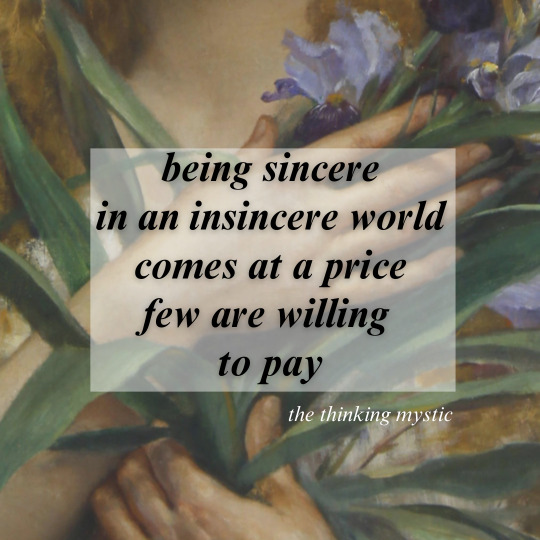
1 note
·
View note
Text
~ Pinned post ~
Hi! My name is Liana. I'm a diviner and Reiki master from South Africa. I've been reading tarot cards for more than fifteen years and working with Reiki for more than five. My interest in the spiritual and esoteric stretches back as far as I can remember, and it's an important part of my daily life.
The truth is, we all need spiritual support every now and then.
Tarot, divination and distance Reiki sessions with me can help support you in your spiritual journey. Together we craft a healing space that is grounding and empowering. Interested to see if we vibe? Check out my other social media pages to get a sense of what I believe and how I work.
To purchase tarot readings or distance Reiki sessions, please visit my store or Etsy.
Follow me on TikTok, YouTube, Instagram one and two, Facebook, and be sure to subscribe to my newsletter for updates and special offers.
#tarot#reiki#divination#tarot reader#reiki master#intuition#thinking mystic#mysticism#spirituality#pinned post#intro post#esotericism#woowoo
0 notes
Photo


Fade into forever.
BACK IN STOCK - The Flux Arcana Tarot has returned to the shop link in my bio, while supplies last.
301 notes
·
View notes
Photo
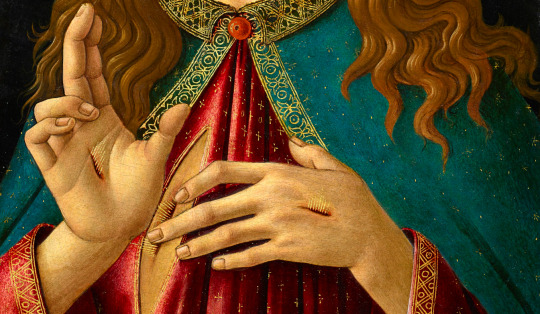
Sandro Botticelli (1445-1510)
Christ (detail of hands)
1495-1500
843 notes
·
View notes
Text
Pick a card: What can I expect from the last quarter 0f 2021?
Hey mystics! What can you expect from the last quarter of this Hierophant year? Take a moment to observe the three sets of cards below. Which one feels most right right now? ~ Click more~ to read your message!
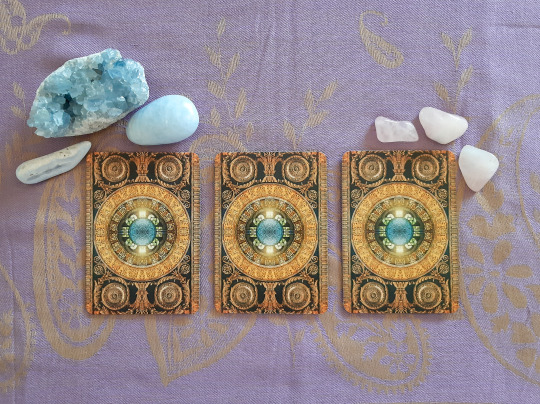
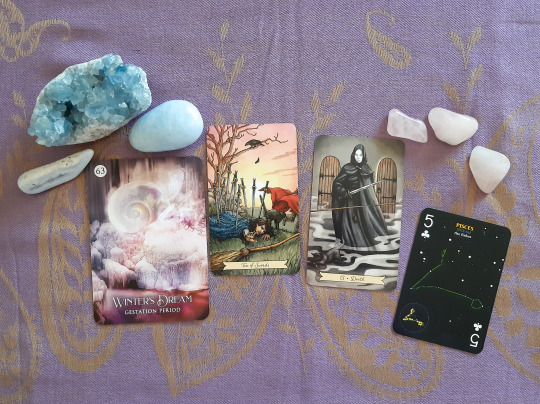
1 - Winter’s Dream (Gestation period); 10 of Swords; Death; Pisces.
If you chose the first pile, likely you’ve felt caught in a weird kind of “post mortem rigour” for a large part of 2021, if not all of it so far. You’ve known that something’s gotta give for quite some time, but, likely no matter your efforts or best intentions, it just hasn’t been happening. Understandably this has led to a lot of frustration and self-recrimination, maybe even a debilitating malaise that you haven’t been able to shake off.
The good news is that the dam wall finally bursts in the last quarter of 2021, and it sweeps away all the gunk that has been collecting in your life and energy field. If you have had a particularly tough time, take heart: the worst of it is over. The last quarter of 2021 clears the way forward and some of your experiences (both recent and older events) shift in a way that makes them make sense in a new, different way; it may even turn out they are useful to you in some way.

2 - Stranger (Curiosity); 8 of Wands; 10 of Pentacles; Leo.
If you chose the second pile of cards, the last quarter of 2021 brings optimism about and progress towards the kind of life that, not so long ago, you may have believed impossible for you to attain. There’s a growing sense of familiarity with and appreciation for your worth. At the very least, I see you becoming more acquainted with the sense of self you felt you lost in the job/relationship/transition that took a chunk out of your expectations and likely your self-esteem. You’re probably going to feel more like yourself--and more like the self you want to be.
In general I feel like the energy in your life stabilises in the way you most need it to. This may not immediately be the way you wished things would turn out. For instance, the cost of regaining that sense of self may well be the loss of the people or situations that made you feel alienated from yourself in the first place, regardless of whether you are ready to let go of them/it. Trust that the progress is worth any sacrifices, and that you--your sense of who you are and your hopes and dreams--are worth the same.

3 - Drifter (Experiencing life as it comes); 4 of Wands rx; 5 of Pentacles; Scorpio.
If you picked the third pile of cards, the last quarter of 2021 is likely the final valley before things steadily start improving. I don’t really see this as imminent calamity; more as a continuation of a situation that has been ongoing for some time and that you desperately wish you were finished with. Not yet, but you’re getting there!
It might help to think of this time as a kind of slow inhale, a pause while you figure out if you’re going in the direction you want to be going--and if you even want to move in a particular direction at all! There is a lot of pressure to perform progress so we can keep up with peers and milestone expectations. Not everyone’s path is that linear, and this last quarter of 2021 may well give you permission to learn to be okay with that and figure out what really matters to you, right now and in the long run.
30 notes
·
View notes
Photo
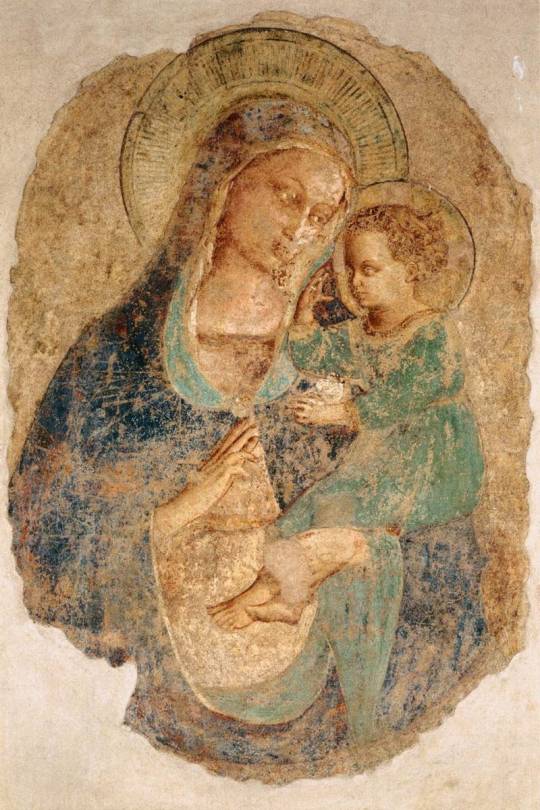
Madonna and Child, 1435, Fra Angelico
Medium: fresco,wall
350 notes
·
View notes
Text
“The rosary is like a portable chapel we can keep in our pocket and pull out anytime, anyplace. Whether we have a sudden, urgent situation to present to God in prayer or we just want to fill some of our day with thoughts of God, all we need to do is pull out our beads and turn to the Lord in this prayer. Indeed, the rosary is always accessible. We might pray it in a church, in our room, in our office. Or we might pray it in the car, on the exercise machine, in the grocery store line, or while cutting the grass or going for a walk. Bringing our hearts into the rhythm of the rosary is something we can do intermittently throughout the day.”
— Why Pray the Rosary
(via liminalblessings)
260 notes
·
View notes

